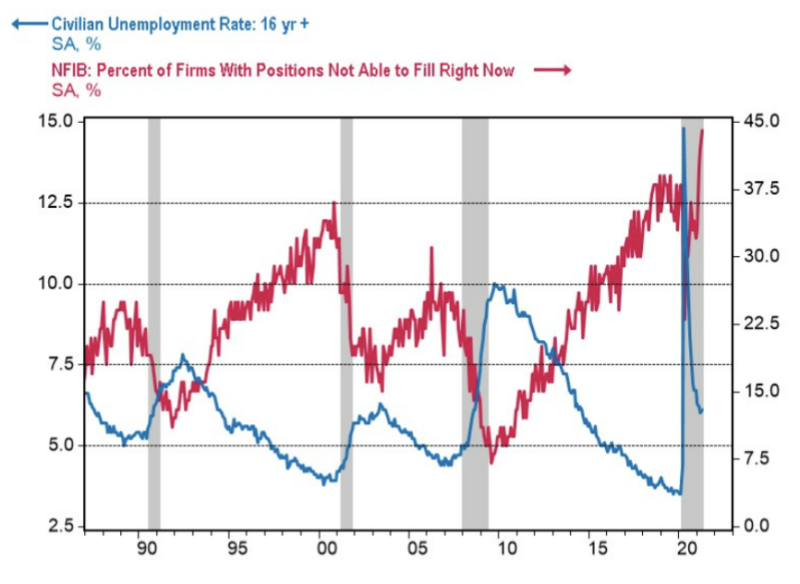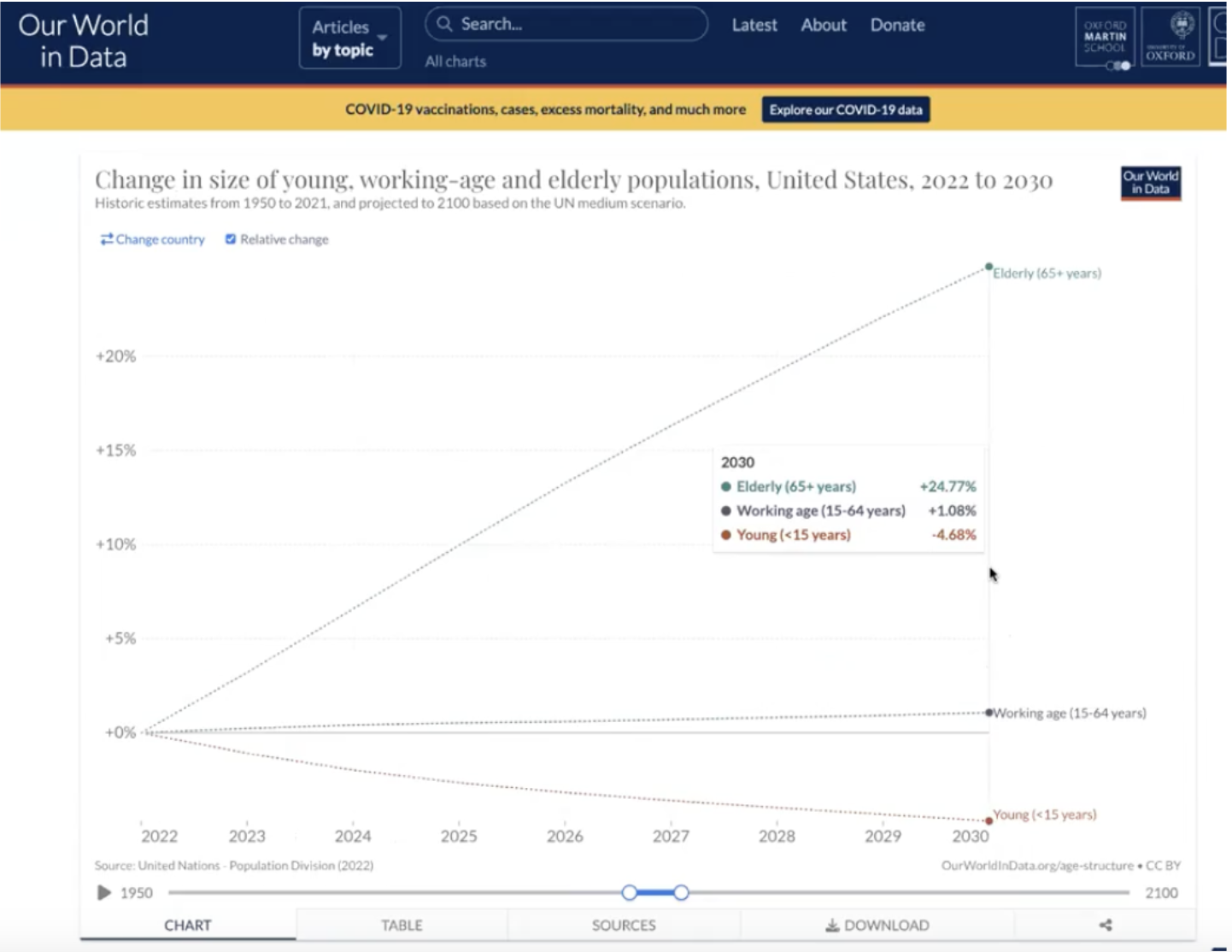The Generational Trends You Can’t Afford to Ignore
“Gen Z have short attention spans.”
“They’re glued to their phones and can’t handle face-to-face interactions.”
“They expect their bosses to baby them.”
There’s no shortage of stereotypes about Gen Z in the workplace, but have we really sought to understand why these stereotypes exist? 🤔
To find some answers to this question and understand how we can best work with Gen Zers to make our workplaces better, Enboarder’s CEO, Brent Pearson, sat down with Jason Dorsey, president and co-founder of The Center for Generational Kinetics and author of “Zconomy: How Gen Z Will Change the Future of Business―and What to Do About It.”
Why does understanding Gen Z matter?
First, let’s zoom out and look at the market in general.
The graph below shows the unemployment rate over time (blue line) layered against the current job openings (red line):

What this graph shows is that, while unemployment is at very low levels and dropping, the percent of firms with positions to fill is at an all-time high – this is an indicator of an incredibly tight labor market. We have a lot of roles to fill, and this is only increasing in the future.
Perhaps more startling is what happens when we compare the rate of change of the working population with respect to the other populations in the years to come:

As you can see from the graph, the working population is only expected to increase by around 1% in the next decade, while the elderly population (the baby boomers who are retiring) is increasing at a rate of almost 25%!
If we can’t figure out how to meaningfully work with Gen Z, we will have an incredibly difficult time filling our necessary roles in the future.
But why is Gen Z so different?
“Back in 1980, the workforce participation rate for people aged 16-19 was 57.7%, but this came down to 37% in December 2022,” Jason pointed out, “but, if you look at it, it was still 52.2% in 2000.”
So, why the sudden drop?
Obviously, COVID played a big part, but there were other factors: “One is a big emphasis on education and de-emphasis on real-world skills,” Jason added. “In many schools, what we’re saying is you’re supposed to go to college, so we essentially don’t want you to work.”
Jason also cited cars and transportation as another big cause, as most of the roles that younger workers fill (like retail and hospitality) don’t have hybrid or remote options, and other factors – like delayed licenses, not teaching drivers ed in school, and even parents not wanting their kids to drive all – also prevent these younger employees from being able to get jobs.
There are also a variety of more qualitative reasons why Gen Z are less motivated to work (like a weaker association between identity and a job and even less peer pressure to have a job).
All of these factors mean that Gen Z are getting jobs later than previous generations did and this means that they generally have less experience going into a job than their predecessors did.
Do generational trends and changes really matter in the workplace?

First, we need to define what generations are.
Dictionary.com defines “generation” as “the entire body of individuals born and living at about the same time,” but Jason defines it differently – a generation isn’t a rigid box defined by the age you were born in as much as it’s an association formed by the experiences you’ve had and who you’ve shared those experiences with.
A group of people with many shared experiences (e.g. living through the Great Depression) act more like a generation than people who just happened to be born roughly in the same years (although those two things often overlap). This is why the same “generations” (as defined by birth year) can act very differently depending on where in the world they were born.
“The important thing to remember,” continued Jason, “is that generations are clues and not a rigid box. They’re powerful and predictive clues to things that help you understand, connect, and influence, but it doesn’t mean you know somebody. It just gives you a head start, and most business leaders I work with are looking for a head start.”
Fundamentally, people want similar things. They want to feel valued, challenged, and included, and have a sense of purpose. Where the differences in generations play out is in how they want those things to look.
But why is Gen Z so much different than Gen Y/millennials?
This is where we reach the crux of the issue:
Gen Z is so much different from millennials because they have had completely different life experiences.
Jason pointed out that millennials are able to remember what life was like before social media and cell phones, and they experienced years in the workplace pre-COVID (similar to the generations before), but Gen Z doesn’t have these experiences.
They never knew what it was like to not have cell phones. They never knew what it was like not to have social media. And they were looking for their first jobs during a global pandemic (if they weren’t laid off because of it).
With so many different experiences, how could they not be “different?”
Now we can see why Gen Z has a different threshold of expectations for using technology, and why there are massive generational differences in things like preferences for communication technologies.
“I’ll give you another one,” Jason added. “Behaviorally, Gen Z cares deeply about stability of employment, but nobody talks about it. Why? Because Gen Z was the number one generation affected by COVID layoffs. Of course they care about stability!”
If we’re truly open to putting ourselves in the shoes of the members of our Gen Z workforce in a way we haven’t before, we can really start to understand why they feel the way they do, and it all starts to make a lot of sense.
What’s more important, productivity or culture?

Obviously, there can seem to be a natural balance between culture and productivity:
- If we only focus on productivity, people burn out.
- If we only focus on culture, we have happy employees that don’t get anything done.
But these two things don’t have to be in tension. As Jason pointed out, this is usually an issue with perception.
“I hear this all the time. It’s usually older generations who say ‘It’s these younger people. They don’t have work ethic. If they just had work ethic.’ And, and I’m like, ‘Well, is it work ethic or is it work style?'”
Jason highlighted the perception that “If you’re not working the way I’m working, then you’re not working hard,” but this doesn’t leave any allowances for people who just work differently, and we need to create a space for both and value both.
Where did all of this talk about burnout come from? 😩
It’s true that we used to hear about burnout much less, but it’s not like it didn’t exist. There have been a few key changes that have made awareness of burnout more prevalent in the last few years:
- Mental health (stress, anxiety, depression, etc.) has become much safer and easier to talk about in the workplace, as we’ve worked to kill the stigmas that used to surround these feelings and conditions.
- Older generations were told to “just work” – they were expected to show up early and leave late or even not leave until the job was done. The focus was purely on productivity and not at all on culture.
And, as the workforce norms are changing, we should be aware that some managers understand that burned-out employees aren’t as productive or helpful, while others may not be as sensitive, which could increase these feelings of burnout. This is why we need to educate our managers to make sure everyone is on the same page with work expectations.
“I believe that Gen Z will be the first generation in the workforce where a majority of them expect to have free mental health benefits and resources wherever they work,” Jason mentioned. “And I think that’s a good thing.”
Is employee experience the missing link? 🔗

“I think it’s absolutely critical,” Jason said. “When we look at initial drivers of interest in a job, it tends to be pay range or scheduling flexibility or benefits, but once somebody’s in a job, employee experience plays a much more massive role on their happiness and retention.”
Employee experience addresses the deeper questions like “do I feel valued and have a sense of place?” And while engagement is certainly a piece of the overall picture, employee experience is more all-encompassing and includes things like communication and human connection.
If we take the time to create these experiences and behaviors, we’ll be able to see measurable results.
“If we can retain those employees and colleagues, it takes the pressure off recruiting, and that’s completely driven by employee experience,” Jason added.
Is hybrid work a good thing or a bad thing?
Things were actually simpler when remote work was required.
Why?
Because we didn’t have the nuance that an optional hybrid work environment brings.
Case in point: People who are in the office are exposed to more opportunities simply because they have more random interactions with other co-workers, which just doesn’t happen in remote situations.
We can also see this nuance in creativity and collaboration. It’s hard to encourage and foster creativity and collaboration in the same ways without being in person at least some of the time.
But the answer isn’t just to bring everyone back to the office (again, remember that some members of the Gen Z workforce have never experienced an in-office work experience for any substantial length of time. Remote/hybrid work is all they’ve ever known.)
So what’s the answer? 👇
“People frequently ask me ‘What’s the one most important thing I need to know about a hybrid workforce?'” said Jason, “and I tell them, when it comes to Gen Z and even younger millennials, the most important concept is fairness. As soon as they think something is unfair, it becomes a mess.”
And the way to manage fairness in a hybrid environment is through consistency and transparency. If one group of people has to come in, while another group doesn’t, explain why. If one group gets to do something and another group doesn’t, be sure to explain your reasoning there too.
We never really had to worry about this at scale before, but, with optional remote or hybrid work, it’s not just about the individual employee’s work arrangement – if it differs from how other members of the team get to operate, our people need to understand our logic and reasoning for a hybrid set up to work.
Why should I invest in learning and development for Gen Z and millennials if they’re just going to leave anyway? 🚪

This is why it’s so important that we refresh our mindset in this area.
Aside from just helping to give our employees the necessary skills they need to perform their job-related tasks, learning and development also shows our people that we value and believe in them, and it shows them that they have a place here and an opportunity to grow – it creates a deeper connection.
“The question is often ‘What if they leave?'” noted Jason, “But I would ask, ‘What if they stay?'”
Of course, offering learning and development produces a positive ROI in helping our employees be more efficient and effective on the job, but it also helps our people to think more long-term about their place in the company, and it generally makes them perceive their company as a better place to work.
This is why we should continue to invest in learning and development. Without investment in L&D for our millennials and Gen Z employees, we may be causing a much greater financial issue via poor retention.
Each generation brings its own gifts 🎁
And, as much as this can be a struggle for us to help our Gen Z employees find their footing in the workplace, this effort comes with a great potential benefit as well, as we get the opportunity to learn from some of their new and fresh perspectives firsthand.
True innovation, the kind of innovation that helps us overcome our competition and break out into new products and new markets, comes from thinking outside of our established box, and that is just one of the things that Gen Z is incredibly gifted with.
So, take a moment to really connect with your Gen Z employees to understand what their life experiences have been and how they are different from what you experienced.
Before long, you’ll be able to genuinely sympathize with, learn, and appreciate your Gen Z employees, and they’ll do the same for you as well.
This is why we should continue to invest in learning and development. Without investment in L&D for our millennials and Gen Z employees, we may be causing a much greater financial issue via poor retention.
Ready to see how Enboarder can help create connections across your company? Book a demo today.